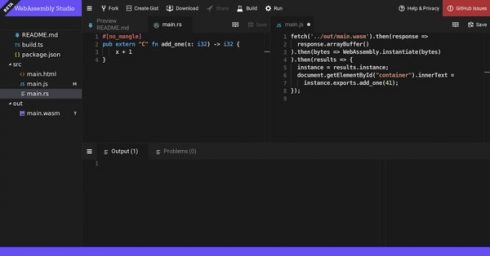
Mozilla is making good on its promise to improve WebAssembly for developers with the beta release of its WebAssembly Studio. WebAssembly Studio is an online IDE for learning and teaching WebAssembly that Mozilla began working on last December. Since then, the company has been working to make WebAssembly more accessible to the programming community. Last month, Mozilla announced a new project to make WebAssembly better for the Rust language and all other programming languages.
According to Mozilla, WebAssembly Studio is a Swiss Army knife, “a collection of useful tools for working with WebAssembly,” the company said in a video.
WebAssembly Studio was initially developed as a way to merge Mozilla’s existing WebAssembly tools WasmExplorer and WasmFiddle.
WebAssembly Studio will have basic C, C++, and Rust support. Mozilla explained that currently most of the compilation services available today are running server-side, but the company hopes to do more of it in the client in the future. WebAssembly Studio will offer the ability to edit WebAssembly binary modules (.wasm) and text files (.wat).
Other features include context menus that provide the ability to do many things in WebAssembly Studio, such as verifying that WebAssembly modules are valid or using Binaryen optimization to pass over WebAssembly modules. The studio’s Binary Explorer visualizes how the code is represented at the binary level. It also offers the ability to embed interactive WebAssembly Studio projects thanks to embed.ly.
In the upcoming months, Mozilla plans to continue to improve upon the project. Some planned features include adding better support for C, C++, and Rust projects; integrating more tools into WebAssembly Studio; making it possible to download and build projects locally using tools that developers are familiar with; and improving UX, error reporting, and general performance optimizations.






